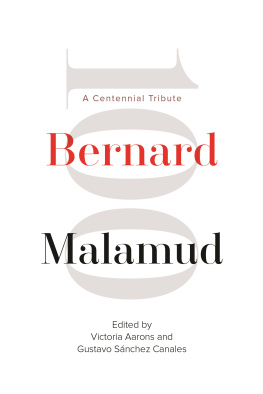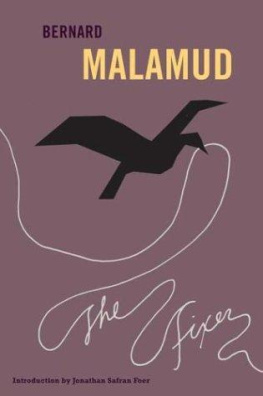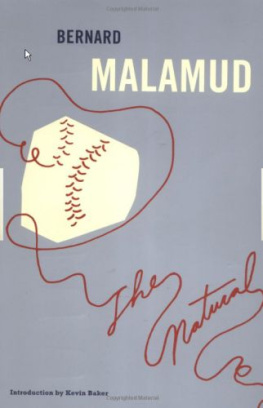My Father Is a Book: A Memoir of Bernard Malamud
Janna Malamud Smith

Selected as a Washington Post Best Book of the Year
and a New York Times Editors Choice
Keen and nuanced... A profound portrait of a loving father, a writer whose struggles with his own frailties fueled enduring works of literature.
Publishers Weekly (Starred review)
This beautifully written book should do much to rekindle interest in Malamuds work.
Heller McAlpin, Newsday
Deserving... generous-spirited... compelling.
Steve Weinberg, San Francisco Chronicle
Excellent... [a traditional] biography would be hard-pressed to match the emotional complexity and intensity that make this memoir hum with energy.
Cleveland Plain Dealer
Moving, unostentatiously eloquent... Analytical without being acrimonious, honest without wallowing in self-preening exposure, this is a wise, generous book full of insight...
Merle Rubin, Christian Science Monitor
Candid yet sensitive... exquisitely captures the particular psychic pleasure and confusion of being the daughter of novelist/short-story writer Bernard Malamud... The author amply demonstrates that she has inherited her fathers unblinking moral scrutiny and sympathy for the yearning heart.
Kirkus Reviews
Smiths own superior writing in My Father Is a Book beautifully evokes her fathers spirit and life, proving that talent runs in the family.
Rocky Mountain News
My Father Is a Book
A MEMOIR OF
BERNARD MALAMUD

Janna Malamud Smith
COUNTERPOINT
BERKELEY
My Father Is a Book: A Memoir of Bernard Malamud
Copyright 2013 by Janna Malamud Smith
All rights reserved under International and Pan-American Copyright Conventions. No part of this book may be used or reproduced in any manner whatsoever without written permission from the publisher, except in the case of brief quotations embodied in critical articles and reviews.
Smith, Janna Malamud.
My Father is a Book: A Memoir of Bernard Malamud / Janna Malamud Smith.
pages cm
ISBN 978-1-61902-200-3 (pbk.)
1. Malamud, Bernard. 2. Novelists, American20th centuryBiography. 3. Novelists, American20th centuryFamily relationships. 4. Malamud, BernardFamily. I. Title.
PS3563.A4Z887 2013
813'.54dc23
[B]
2012040857
COUNTERPOINT
1919 Fifth Street
Berkeley, CA 94710
www.counterpointpress.com
Distributed by Publishers Group West
10 9 8 7 6 5 4 3 2 1
For Peter Malamud Smith
and Zachary Malamud Smith
Contents
For one thing love and death have in common more than those vague resemblances people are always talking about, is that they make us question more deeply, for fear that its reality will slip away from us, the mystery of personality.
MARCEL PROUST, Swanns Way
This memoir tells my story about my father, the writer Bernard Malamud. I wasnt sure Id ever write it. My initial reaction to having any of his intimate letters and journals made public was intense and negative. I wrote a piece, published in the New York Times Book Review in 1989, in which I explored his complex sense of privacy and my own. I noted Dads pleasure in reading biographies and the fact that hed written a novel, Dubins Lives, about a biographer. But I also described how fiercely he guarded the personal sources of his fiction and how he delighted in Shakespeares relative biographical anonymity. Troubled by pathographiesbiographies that gain their sales by demeaning their subjectsI applauded James Joyces grandson, Stephen Joyce, for publicly claiming a familys right to destroy material as they saw fit. I ended by stating that I thought it most unlikely that Id ever make the contents of my fathers early journals public.
Now I am doing so. How do I justify my own change of heart? Im not sure I can. In part I have to laugh at myself: When I finally read the notebooks, I realized their content didnt need my protection. But the larger answer is that time has passed. Dad has been dead for nearly two decades. My grief has abated. I am older. Our family past has come to feel distant enough to approach. When I wrote my first book, Private Matters, I broadened my own understanding of privacyand subsequently needed less of it. So, too, as my mother moved through her eighties, a balance tipped for me between shielding her and capturing her knowledge.
One day I realized that my fathers life had shifted from something overshadowing into something disappearing from view. With the aging of my mother and the deaths of so many of their friends, my own witness had become one of a few remaining membranes holding the boundary between life and void. Writing more also altered my perspective. Years practicing allowed me insight into his effort, and left me with a better understanding of him. My loyalties gradually shifted.
WRITING A MEMOIRthe process of remembering, together with conversations and the reading of letters and journalshas been pleasurable and painful, even more moving than I expected. The revisiting, the learning, and the daily work of describing have all brought an unexpected acceptance: Yes, this is who he was; this is who I am. I realized when I finished the book that he had somehow become mine again: A muddle had cleared, and I could feel a simpler love for him. Meanwhile, I have struggled to speak frankly without harming living people or violating their privacy. Honoring familial requests, I have removed some names and a few bits of text.
In the process of writing, I read or reread Dads novels and stories. Like every writers work, my fathers fiction grew out of his experience, his thoughts, and his fantasy. Although his characters views diverge from his own in many places, there is no doubt that they sometimes speak his mind. For that reason, I occasionally quote their voices to articulate his feelings. To disarm his ghosts irritation, or at last to amuse him, I have taped on the refrigerator a line clipped from a newspaper: May your house be free of memoirists. They cause such trouble.
This book was preceded by an essay of the same title, which I wrote in 2001.because it captures several pleasing condensations about my fatherthe pull he felt between the everyday world and his art making, the depth of his belief in the transformative power of books, and the way some ever animate part of him is stored within their pages. It also says something, more fully elaborated in the chapters that follow, about the particular psychic pleasure and confusion of being his daughter.
MORE THAN A FEW people have suggested to me that the absence of a biography has worked to my fathers disadvantage. What once was a trioSaul Bellow, Bernard Malamud, and Philip Rothbecame a dyad, partly because Malamud died first, but also because biographies are a way we designate writers as significant and keep their fiction alive. I have felt some guilt for my part in discouraging such undertakings and my family is now cooperating with Philip Davis, a British literary critic who is writing a life. His acceptance of the harder assignment has left me free to write this more personal story.
Next page






